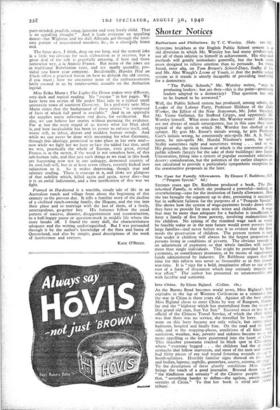Into China. By Eileen Bigland. (Collins. I8s.)
As the Burma Road becomes world news, Miss Bigland's book explodes in the lap of Western Civilisation as a reminder that the war in China is three years old. Against all the best advice. Miss Bigland chose to enter China by way of Rangoon, Manda- lay and the "highway which has materialised from the vision of that grand old man, Sun Yat Sen." Escorted more or less by an official of the Chinese Travel Service, of which the chief defect was that there was no service, she travelled by lorry. As time bomb-splinters. Horribly familiar signs showed on the r face! eating-place'
went on this lorry became not only vehicle, but
bedroom, hospital and finally bier. On the road and the road- side, and at the stopping-places, conditions of all kinds. f°°d• sanitation, weather, war, poverty and sickness became mere and more appalling as the lorry penetrated into the heart of China. This macabre panorama reached its black spot in Chtrigicing. where " everyone begged . . . the children had the di :ended stomachs that follow starvation, and most of the men and .vomen had filthy pieces of rag tied round festering wounds Ca' -ed by and bodies, leprosy, syphilis, gonorrhea, scurvy, eczema, im.,enge To the description of these ghastly conditions Miss Bigland brings the touch of a good journalist. Beyond them s:te aces, " the kindliness and serenity " of the Chinese people; berm that, " something harder to define—the ageless, unconquerable serenity of China." To that her book is vivid and Pa'nfuj tribute.


























 Previous page
Previous page